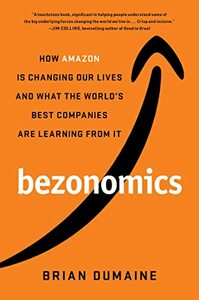Take a photo of a barcode or cover
19 reviews for:
Bezonomics: How Amazon Is Changing Our Lives and What the World's Best Companies Are Learning from It
Brian Dumaine
19 reviews for:
Bezonomics: How Amazon Is Changing Our Lives and What the World's Best Companies Are Learning from It
Brian Dumaine
A nice complement to Brad Stone's seminal book The Everything Store. His book is well researched, to be sure.
A few times Dumaine gets sidetracked. For example, universal basic income is an important concept but doesn't really fit under his Bezonomics umbrella. Sure, it's a side effect of larger economic trends, but so are many things. Also, his constant mentioning of the AI flywheel gets a tad old about halfway through the book.
Apart from a few minor criticisms, though, I enjoyed it.
A few times Dumaine gets sidetracked. For example, universal basic income is an important concept but doesn't really fit under his Bezonomics umbrella. Sure, it's a side effect of larger economic trends, but so are many things. Also, his constant mentioning of the AI flywheel gets a tad old about halfway through the book.
Apart from a few minor criticisms, though, I enjoyed it.
I’m so pleasantly surprised with this book. It’s well-researched and dives into not only the business aspects of Amazon but the ethical and technical parts too. I enjoyed reading this!
For this and other reviews, visit www.bargain-sleuth.com.
I’ve been with Amazon almost since their beginning. Since they first opened as an online bookstore, why wouldn’t I be? I just looked at how many orders I’ve placed on Amazon this year, both digital and hard goods, and it is embarrassingly high. An early adopter of Amazon Prime, we have the Chase Amazon Prime Rewards Card which gives us 5% back on all Amazon purchases. Last year we received more than $800 cash back and are on track to get even more this year! With a family of six, I don’t mind buying groceries in bulk through their Subscribe & Save program or through Pantry, saving me a Costco or Sam’s Club membership as well. My husband was out of work for 10 months, and we were on food stamps. Amazon began accepting food stamps a few months into the pandemic, so I was able to purchase my usual grocery orders with Amazon using our EBT card, adding to our increased order count.
I also love streaming movies and TV shows off Amazon Prime Video. You all know how much I love my Kindle, and my two younger daughters also have Kindles. I stream videos on my Kindle Fire every night. We also have three Fire Sticks for our TVs so we can stream Netflix, Disney+, Sunday mass, and the Green Bay Packers channel.
That doesn’t mean I don’t shop locally, I try to do as much of that as possible, too, especially independent bookstores and specialty stores for my kids’ gifts, like the locally-owned Gnome Games or Game Capital, which sell Pokemon, Yu Gi Oh and tons of other games and cards. I favor the Wisconsin-owned grocery stores and frequently order take-out from locally-owned restaurants. Especially now, during the pandemic, I’ve turned to Amazon again and again because I live in a house with someone who is high risk in two categories: age and health issues.
However, I do believe Amazon is getting too big. Now, my Amazon packages might be delivered by the USPS, or they might be dropped off from an Amazon delivery truck, something new to our area in the past few weeks. I’m a big fan of President Theodore Roosevelt and how he busted up several big businesses because they were monopolies, but quite frankly, I can’t see how a president or Congress could break up a company like Amazon that has gotten that big globally.
The whole Alexa/Echo Artificial Intelligence things scares me. The stories in the book were enough to turn me away from any AI in the near future: the boss whose home conversations were sent to his co-workers, the man who received a large file of someone’s conversations. Someone he didn’t know. But he gave the file to some journalists, and through those Alexa sound files, they were able to track the original owner down as well as know many of his habits, and we’re not just talking about shopping here.
If you’re not into tech and don’t know much about the Amazon business model of “the flywheel” then you should read this. Bezonomics: How Amazon Is Changing Our Lives, and What the World’s Best Companies Are Learning from It offers a look at what sort of company Amazon is, both the good and the bad, and how it affects us as consumers.
The book also looks at companies who are doing things differently from Amazon and how they are surviving and thriving. Bezonomics also tells the cautionary tales of companies that tried to go up against Amazon and lost, like Diapers.com, driven out of business because Amazon undercut them with their prices. I had kids in diapers at the time, and I remember the fabulous deals Amazon was giving me, why would I shop anywhere else for diapers? (Diapers.com was ultimately bought by Amazon) I also used Drugstore.com a lot, and they were so successful, Amazon bought them out, then shuttered the business.
I recommend this book for any supporters or detractors of the retail behemoth. It’s eye-opening to say the least.
I’ve been with Amazon almost since their beginning. Since they first opened as an online bookstore, why wouldn’t I be? I just looked at how many orders I’ve placed on Amazon this year, both digital and hard goods, and it is embarrassingly high. An early adopter of Amazon Prime, we have the Chase Amazon Prime Rewards Card which gives us 5% back on all Amazon purchases. Last year we received more than $800 cash back and are on track to get even more this year! With a family of six, I don’t mind buying groceries in bulk through their Subscribe & Save program or through Pantry, saving me a Costco or Sam’s Club membership as well. My husband was out of work for 10 months, and we were on food stamps. Amazon began accepting food stamps a few months into the pandemic, so I was able to purchase my usual grocery orders with Amazon using our EBT card, adding to our increased order count.
I also love streaming movies and TV shows off Amazon Prime Video. You all know how much I love my Kindle, and my two younger daughters also have Kindles. I stream videos on my Kindle Fire every night. We also have three Fire Sticks for our TVs so we can stream Netflix, Disney+, Sunday mass, and the Green Bay Packers channel.
That doesn’t mean I don’t shop locally, I try to do as much of that as possible, too, especially independent bookstores and specialty stores for my kids’ gifts, like the locally-owned Gnome Games or Game Capital, which sell Pokemon, Yu Gi Oh and tons of other games and cards. I favor the Wisconsin-owned grocery stores and frequently order take-out from locally-owned restaurants. Especially now, during the pandemic, I’ve turned to Amazon again and again because I live in a house with someone who is high risk in two categories: age and health issues.
However, I do believe Amazon is getting too big. Now, my Amazon packages might be delivered by the USPS, or they might be dropped off from an Amazon delivery truck, something new to our area in the past few weeks. I’m a big fan of President Theodore Roosevelt and how he busted up several big businesses because they were monopolies, but quite frankly, I can’t see how a president or Congress could break up a company like Amazon that has gotten that big globally.
The whole Alexa/Echo Artificial Intelligence things scares me. The stories in the book were enough to turn me away from any AI in the near future: the boss whose home conversations were sent to his co-workers, the man who received a large file of someone’s conversations. Someone he didn’t know. But he gave the file to some journalists, and through those Alexa sound files, they were able to track the original owner down as well as know many of his habits, and we’re not just talking about shopping here.
If you’re not into tech and don’t know much about the Amazon business model of “the flywheel” then you should read this. Bezonomics: How Amazon Is Changing Our Lives, and What the World’s Best Companies Are Learning from It offers a look at what sort of company Amazon is, both the good and the bad, and how it affects us as consumers.
The book also looks at companies who are doing things differently from Amazon and how they are surviving and thriving. Bezonomics also tells the cautionary tales of companies that tried to go up against Amazon and lost, like Diapers.com, driven out of business because Amazon undercut them with their prices. I had kids in diapers at the time, and I remember the fabulous deals Amazon was giving me, why would I shop anywhere else for diapers? (Diapers.com was ultimately bought by Amazon) I also used Drugstore.com a lot, and they were so successful, Amazon bought them out, then shuttered the business.
I recommend this book for any supporters or detractors of the retail behemoth. It’s eye-opening to say the least.
A really interesting, nuanced, balanced look at Amazon’s business model, structure, and impact on society and economics. Also provided some ideas regarding possible global consequences of big tech. A little repetitive at points but extremely readable and informative. Highly recommend.
Bezonomics: How Amazon Is Changing Our Lives and What the World’s Best Companies Are Learning from It by Brian Dumaine extensively describes how Amazon has taken over the online shopping business from almost all competition. That being the reason there are lawsuits all over the world to punish the company for unlawful competition practices. We also learn quite a bit about Jeff Bezos himself such as his family background, education, humble beginnings of Amazon, his family, his attitude towards the importance of the customer and how he treats his staff members. Extensive research has been done by the author and sheds informed light on the Amazon we do not know. Very informative and well-written. Highly recommend.
Because I was compelled through annoyance to pound my fists against the wall EVERY DAMN TIME HE SAID FLYWHEEL I now have two bloodied stumps at the ends of my arms where my hands used to be.
Seriously, get over it. As well as the Repeated. Use. Of. That. Term. A term he never once explains. Entire concepts get brought up over and over again. Several hundred times I reckon.
There was probably about two pages of interesting information in this. There's nothing in here that will be of surprise to anyone paying attention to current affairs.
What is Bezonomics? Be horrible to your workforce at all levels to blindly make customers happy regardless of if the customers are idiots.
The six page memo idea is interesting though.
I'm not sure why you have to do both of those.
Seriously, get over it. As well as the Repeated. Use. Of. That. Term. A term he never once explains. Entire concepts get brought up over and over again. Several hundred times I reckon.
There was probably about two pages of interesting information in this. There's nothing in here that will be of surprise to anyone paying attention to current affairs.
What is Bezonomics? Be horrible to your workforce at all levels to blindly make customers happy regardless of if the customers are idiots.
The six page memo idea is interesting though.
I'm not sure why you have to do both of those.
Bezonomics is a detailed look at the history of Amazon and where it may be looking to expand to in the future (although it’s more of speculation, as the company is famously secretive about where it will expand next). I thought from the title that this would be more about the economics of Amazon’s stock management, pricing and famous algorithm but it’s not. Sure, they are covered but it’s not incredibly in depth.
The book starts with the history of Amazon and then looks at how it managed to create disruption in multiple markets, from books to general online selling. A lot is made of collecting customer data to determine what you like and offering tailored recommendations. (I would say that having experienced those, sometimes they are way off the mark. Amazon, you can only have so many notebooks!) Product placement on the search pages and the ability of Amazon to use that data to make their own products also has a lot of page time, bringing up the question of whether Amazon destroys small business. There are cases for and against this, but it tends to be on the side that Amazon Marketplace is creating more opportunities for small businesses. Generally, the book takes on a supportive tone of Amazon.
The book also covers the future for Amazon, considering that they may expand into the healthcare market in the US. (This book was written before the pandemic, so I don’t know whether this is still a thing). It’s an interesting idea, particularly as the healthcare system in the US is so different to other countries – more of a free but still flawed market. It all depends if Amazon’s ‘AI flywheel’ (the constant refrain in this book) can keep spinning against a highly restricted and legislated market where the stakes are a lot higher in terms of money and patient care.
While I enjoyed the book overall, I did have to stop several times to shake my head at the differences between the Amazon US market and other countries. For example, I have Amazon Prime and ordered a book that is in stock, across the other side of the country. Shipping is free as expected, but it’s not overnight or 2-day delivery as in the US – it’s 5 weeks. And that’s not unusual – one of my Black Friday orders (a video game) took 4 weeks to travel 2500 miles. There seems to be some disparity in the services offered between countries – maybe it’s just who Amazon chooses to partner with for deliveries, maybe it’s that I’m in a relatively small market. The book is well written, and if you’re not aware of Amazon’s various expansions and rare failures, you will enjoy the insight into this huge company.
http://samstillreading.wordpress.com
The book starts with the history of Amazon and then looks at how it managed to create disruption in multiple markets, from books to general online selling. A lot is made of collecting customer data to determine what you like and offering tailored recommendations. (I would say that having experienced those, sometimes they are way off the mark. Amazon, you can only have so many notebooks!) Product placement on the search pages and the ability of Amazon to use that data to make their own products also has a lot of page time, bringing up the question of whether Amazon destroys small business. There are cases for and against this, but it tends to be on the side that Amazon Marketplace is creating more opportunities for small businesses. Generally, the book takes on a supportive tone of Amazon.
The book also covers the future for Amazon, considering that they may expand into the healthcare market in the US. (This book was written before the pandemic, so I don’t know whether this is still a thing). It’s an interesting idea, particularly as the healthcare system in the US is so different to other countries – more of a free but still flawed market. It all depends if Amazon’s ‘AI flywheel’ (the constant refrain in this book) can keep spinning against a highly restricted and legislated market where the stakes are a lot higher in terms of money and patient care.
While I enjoyed the book overall, I did have to stop several times to shake my head at the differences between the Amazon US market and other countries. For example, I have Amazon Prime and ordered a book that is in stock, across the other side of the country. Shipping is free as expected, but it’s not overnight or 2-day delivery as in the US – it’s 5 weeks. And that’s not unusual – one of my Black Friday orders (a video game) took 4 weeks to travel 2500 miles. There seems to be some disparity in the services offered between countries – maybe it’s just who Amazon chooses to partner with for deliveries, maybe it’s that I’m in a relatively small market. The book is well written, and if you’re not aware of Amazon’s various expansions and rare failures, you will enjoy the insight into this huge company.
http://samstillreading.wordpress.com
informative
medium-paced
informative




